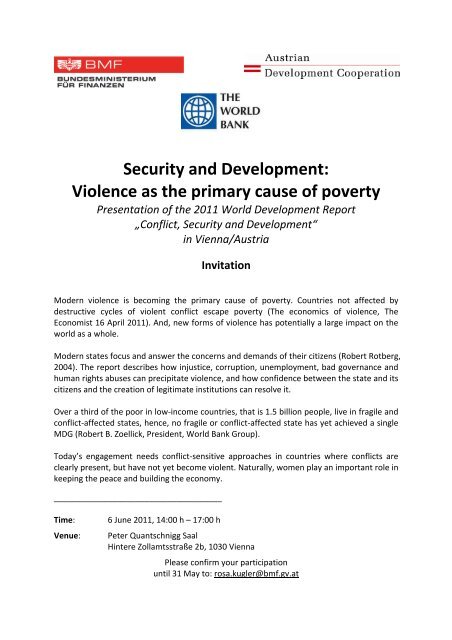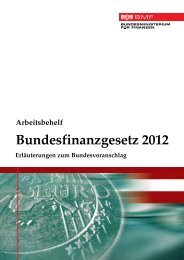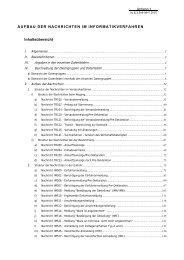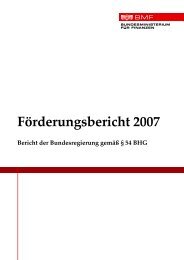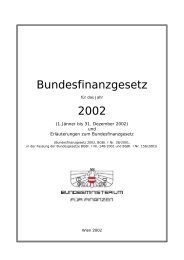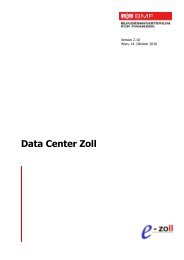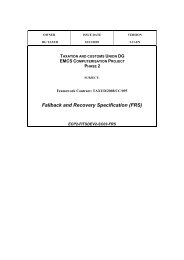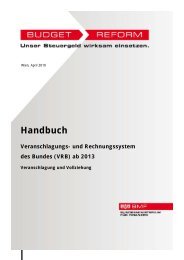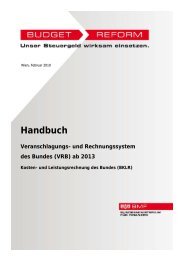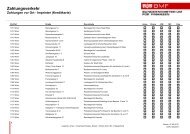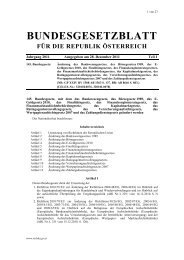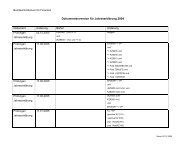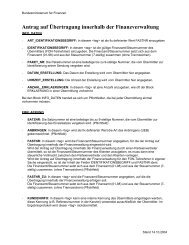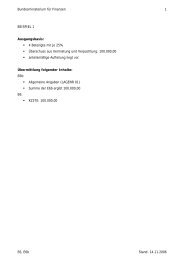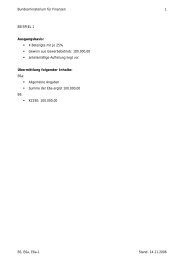Security and Development: Violence as the primary cause of poverty
Security and Development: Violence as the primary cause of poverty
Security and Development: Violence as the primary cause of poverty
You also want an ePaper? Increase the reach of your titles
YUMPU automatically turns print PDFs into web optimized ePapers that Google loves.
<strong>Security</strong> <strong>and</strong> <strong>Development</strong>:<br />
<strong>Violence</strong> <strong>as</strong> <strong>the</strong> <strong>primary</strong> <strong>cause</strong> <strong>of</strong> <strong>poverty</strong><br />
Presentation <strong>of</strong> <strong>the</strong> 2011 World <strong>Development</strong> Report<br />
„Conflict, <strong>Security</strong> <strong>and</strong> <strong>Development</strong>“<br />
in Vienna/Austria<br />
_____________________________________<br />
Invitation<br />
Modern violence is becoming <strong>the</strong> <strong>primary</strong> <strong>cause</strong> <strong>of</strong> <strong>poverty</strong>. Countries not affected by<br />
destructive cycles <strong>of</strong> violent conflict escape <strong>poverty</strong> (The economics <strong>of</strong> violence, The<br />
Economist 16 April 2011). And, new forms <strong>of</strong> violence h<strong>as</strong> potentially a large impact on <strong>the</strong><br />
world <strong>as</strong> a whole.<br />
Modern states focus <strong>and</strong> answer <strong>the</strong> concerns <strong>and</strong> dem<strong>and</strong>s <strong>of</strong> <strong>the</strong>ir citizens (Robert Rotberg,<br />
2004). The report describes how injustice, corruption, unemployment, bad governance <strong>and</strong><br />
human rights abuses can precipitate violence, <strong>and</strong> how confidence between <strong>the</strong> state <strong>and</strong> its<br />
citizens <strong>and</strong> <strong>the</strong> creation <strong>of</strong> legitimate institutions can resolve it.<br />
Over a third <strong>of</strong> <strong>the</strong> poor in low-income countries, that is 1.5 billion people, live in fragile <strong>and</strong><br />
conflict-affected states, hence, no fragile or conflict-affected state h<strong>as</strong> yet achieved a single<br />
MDG (Robert B. Zoellick, President, World Bank Group).<br />
Today’s engagement needs conflict-sensitive approaches in countries where conflicts are<br />
clearly present, but have not yet become violent. Naturally, women play an important role in<br />
keeping <strong>the</strong> peace <strong>and</strong> building <strong>the</strong> economy.<br />
Time: 6 June 2011, 14:00 h – 17:00 h<br />
Venue: Peter Quantschnigg Saal<br />
Hintere Zollamtsstraße 2b, 1030 Vienna<br />
Ple<strong>as</strong>e confirm your participation<br />
until 31 May to: rosa.kugler@bmf.gv.at
All in all, interventions are political. Therefore, dealing with conflict-affected countries is a<br />
team effort. These problems require a focused <strong>and</strong> coherent approach, referred to <strong>as</strong> <strong>the</strong> 3C<br />
approach, a coordinated, complementary <strong>and</strong> coherent action in fragile situations. It is a<br />
ple<strong>as</strong>ure to see that <strong>the</strong> Worldbank, <strong>the</strong> International Network on Conflict <strong>and</strong> Fragility <strong>and</strong><br />
o<strong>the</strong>rs are moving in <strong>the</strong> same direction.<br />
Main topics <strong>of</strong> <strong>the</strong> Worldbank <strong>Development</strong> Report 2011 are:<br />
1. <strong>Security</strong> <strong>and</strong> justice <strong>as</strong> key components <strong>of</strong> peacebuilding: This means investing in<br />
<strong>the</strong> justice sector, demobilising combatants by providing jobs <strong>and</strong> supporting<br />
inclusive peace arrangements.<br />
2. Inclusive enough coalitions to build resilient states: Immediate action is required to<br />
strenghten state-society relations. New peacebuilding <strong>and</strong> statebuilding strategies<br />
build upon articulated human security needs.<br />
3. Employment to stop fragility: Short term results for tax payers to get <strong>the</strong>ir share <strong>of</strong><br />
<strong>the</strong> peace dividend <strong>and</strong> sustainable solutions encouraging private sector<br />
development have to be addressed simultaneously.<br />
The ground-braking report tries to translate <strong>the</strong>se findings into an improved involvement at<br />
<strong>the</strong> state level <strong>and</strong> better cooperation <strong>of</strong> multilateral <strong>and</strong> o<strong>the</strong>r players to <strong>as</strong>sist genuine<br />
ways to peace, security <strong>and</strong> development. [uwp]<br />
Quelle: Stadt Wien – ViennaGIS<br />
www.wien.gv.at/viennagis/
1400 h Introduction<br />
Draft Programme<br />
6 June 2011<br />
Peter Quantschnigg Saal<br />
Hintere Zollamtsstraße 2b, 1030 Vienna<br />
Thom<strong>as</strong> Wieser, Austrian Ministry <strong>of</strong> Finance – Words <strong>of</strong> Welcome<br />
14.10 h The Report - Presentation <strong>of</strong> Main Findings<br />
Sarah Cliffe, Director, Worldbank, Teamleader <strong>of</strong> WDR 2011<br />
„The new modes <strong>of</strong> h<strong>and</strong>ling fragile situations“<br />
14.40 h Coherent action in fragile situations – new answers to situations<br />
<strong>of</strong> fragility <strong>and</strong> <strong>the</strong>ir impact on Austrian policies<br />
Panelists:<br />
15.40 h Discussion<br />
Reinhard Trischak, Brigadier General, Austrian Ministry for Defence <strong>and</strong><br />
Sports – „The socio-economic impact <strong>of</strong> peacekeeping missions“<br />
Yvonne K<strong>as</strong>umba, Civilian Planning <strong>and</strong> Coordination Office, African<br />
Union – “Civilian capacities within <strong>the</strong> African St<strong>and</strong>by Forces” (tbc)<br />
Wolfram Schaffar, Department <strong>of</strong> <strong>Development</strong> Studies, University <strong>of</strong><br />
Vienna, „Intervention in fragile situations, an academic perspective“<br />
Max Santner, Platform Global Responsibility, Austrian Red Cross –<br />
„How civil society meets <strong>the</strong> security challenge in fragile contexts“<br />
Konstantin Huber, Austrian Executive Director, Worldbank,<br />
„Recommendations <strong>and</strong> implementation by <strong>the</strong> Worldbank“<br />
Chair: Amb. Freudenschuss-Reichl, Director General, Austrian<br />
<strong>Development</strong> Cooperation<br />
Followed by a Reception (end 1700 h)


